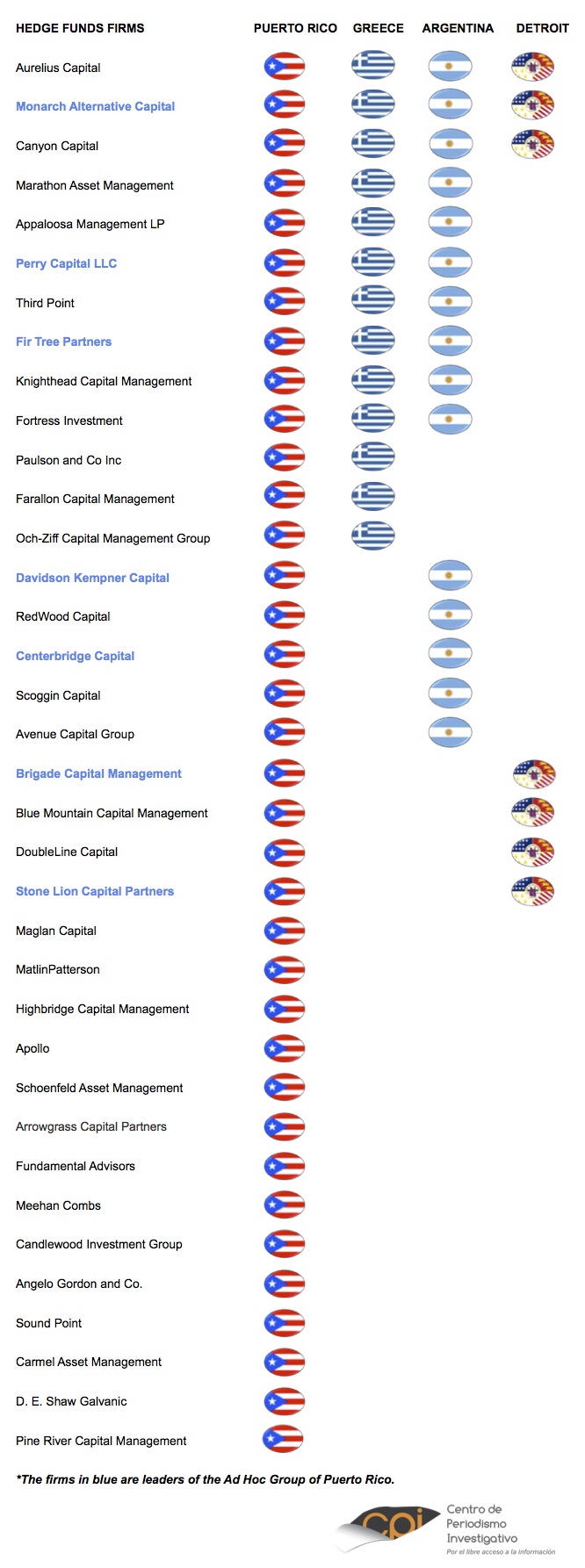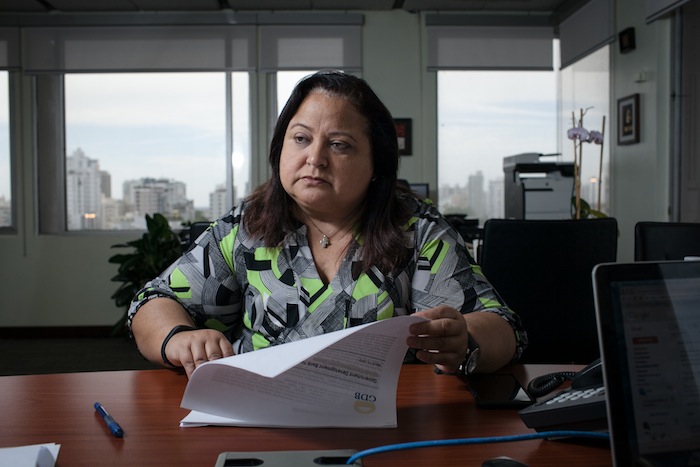
Which are the hedge funds that will make millions of dollars from the debt of the government of Puerto Rico? Politicians and agency chiefs know, but they protect their identities.
HEDGE FUNDS VERIFICATION TABLE
For the last four months, the Center for Investigative Journalism has requested that information from La Fortaleza, the Government Development Bank (GDB), the Office of the Resident Commissioner, Pedro Pierluisi, Senator Ramón Luis Nieves and Anthony Princi, speaker for the Ad Hoc Group of Holders of Puerto Rico Bonds, made up of hedge and vulture funds. The result: run-arounds and silence.
They also keep secret the documents that state the proposals or conditions established by the bondholders to collect or lend more money to the government.
 A mandamus was presented yesterday at the Court of First Instance in San Juan by the CPI (Spanish acronym for the Center for Investigative Journalism) legally requesting this information of high public interest, since the investment firms that are interested in collecting their debt are trying to influence economic and political decisions to secure their gains, which would entail that essential services for the citizens of the island could be affected by the lack of liquidity of the government.
A mandamus was presented yesterday at the Court of First Instance in San Juan by the CPI (Spanish acronym for the Center for Investigative Journalism) legally requesting this information of high public interest, since the investment firms that are interested in collecting their debt are trying to influence economic and political decisions to secure their gains, which would entail that essential services for the citizens of the island could be affected by the lack of liquidity of the government.
Melba Acosta, president of the GDB, confirmed this. “We can use all of our budget to pay the debt, but forget security, forget health, forget education. If we focused on paying the debt and nothing else, eventually, yes, services would be affected. That’s what we are talking about.”
“Press reports are really the sole source of decent data on hedge fund involvement in Puerto Rico, sadly. Hedge funds don’t have to disclose bond buys, either in the primary market (a new government issuance) or in a secondary market sale (when one investor sells to another). So you basically have to rely on reporters seeing documents, hearing things, etc. Not a great situation, and certainly a transparency issue,” explained CPI Kevin Connor, broker of LittleSis, a portal with a database about persons with interest in business and the government.
The lack of information on hedge funds is due to in part that the Securities and Exchange Commission (SEC), federal agency that regulates securities, exempts them from revealing certain details that it demands from other traditional investment funds.
But this does not mean that government officials do not know.
I have no idea who you are
Since last year, hedge and vulture funds representatives visit the offices of legislators at the Capitol constantly. One of them is Ramón Luis Nieves, senator of the Popular Democratic Party, who says that he has held lively meetings with hedge fund representatives but alleges that he does not remember their names or the companies they represent.
“I will confess that, if you ask me now, there have been so many, so many, and so many with whom I have met, that I cannot give you a name here or a name there. We know that there is a group called the Ad Hoc Committee of Puerto Rico. But you are asking me for companies and I don’t even know their names, because there have been so many meetings,” said Nieves in an interview with the Center for Investigative Journalism.
“They started visiting me and that is not strange. These are people that have some interests in Puerto Rico and want to know how policy makers in the different areas of government think and their opinions. They need this information to make investment decisions and that is not illegal or immoral or anything”, he added.
“I have met with hedge funds that are interested in the Puerto Rico Electric Power Authority, with hedge funds with interest in the GO’s. Since many of these companies usually have many resources and have dynamics used in the world with hedge funds, which they purchase at quite low prices in their dealings and then try to push to obtain the highest yield from their investment based on set interests and conditions”.
“Observing the large presence of hedge funds in the public debt has worried me, but on the other hand, I do understand why this happens. It is not so simple. Puerto Rico has an economy which has lost its traditional funding sources and, who is going give us a loan? It is something very simple. These people are willing to give us loans, obviously based on conditions that are beyond the amount that we are borrowing; those are the more worrisome conditions. The interests, under the jurisdiction of the Southern district of New York, make for another type of more complicated conditions,” the senator said, after assuring that he had been one of the first politicians in calling them ‘vulture funds’ in Puerto Rico.
Melba Acosta, president of the GDB, repeated the same speech. The CPI has requested information from this agency on six occasions. When interviewed on whether she knew the bondholders that have a debt with the government, she told us:
 “The GDB does not have that information, you need to remember that when the debt is issued initially, the GDB knows who buys that debt but it continues to be re-sold and the ones who have that information are the brokers and the ones who keep re-selling it. I am sure that there is a way to find out.”
“The GDB does not have that information, you need to remember that when the debt is issued initially, the GDB knows who buys that debt but it continues to be re-sold and the ones who have that information are the brokers and the ones who keep re-selling it. I am sure that there is a way to find out.”
But, do you have the information of who bought the original debt issued in 2014?
“Well, I would have to see….”.
Later, in the same interview, Acosta contradicted herself once more.
And those who bought the original debt, do you have that list?
“I assume that its Barclays, which is the large firm, that has them, because it was in charge of the transaction.”
And the GDB has the right to request it from Barclays, no?
“I could request it, yes.”
Afterwards, Acosta lost her memory. “We do not have the Ad Hoc Group list; we know some of the companies that are part of Ad Hoc, but we do not have a list of its members. They are very private. I know that there is one company called Fir Tree Capital. They call themselves the Ad Hoc Group. I meet with them,” Acosta admitted.
How is it possible that you do not know who they are?
“They come here but I do not ask them to sign in a paper. But if you ask me right now for the complete list, I don’t have it. They usually come with lobbyists”.
And who are the lobbyists?
“At this moment, I can’t remember who they came with. They have come with (Kenneth) McClintock, with Roberto Pratts, but the Ad Hoc Group has not come with any of them. It has come with someone but I can’t remember right now…”
Hedge funds have kept in contact, at least since 2013, with major government officials, including ex-Governor Luis Fortuño. In October 2013, 25 investors met for two hours with Fortuño in a breakfast meeting at the Los Angeles Hotel. Present at the breakfast meeting were traditional fund members such as Capital Research Management and hedge fund Farallon Capital, whose representative asked Fortuño about the political and economic conditions in Puerto Rico. “They can smell blood and fear,” said Richard Larkin, municipal bonds analyst, in regards to investment companies that dread a restructuring of Puerto Rico’s debt, which could mean that they would not receive payments based on their demands on terms and conditions.
In August 2014, another group of companies was invited to a fundraising activity for Pedro Pierluisi, the 2016 New Progressive Party candidate for governor, at the Peninsula Hotel in Midtown Manhattan, New York. The suggested contribution, according to an invitation sent to a hedge fund company, was $2,600, The New York Times revealed.
Although the government and politicians protect the identity of the hedge fund companies that hold part of the debt, the CPI has developed a verified and updated list of the companies that are going to renegotiate the debt or demand its total payment. The list is not exhaustive and we didn’t have the benefit of being able to compare it with the official government data.
Graphics by Laura Moscoso



